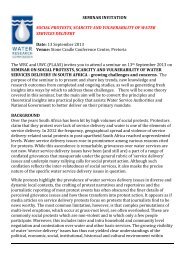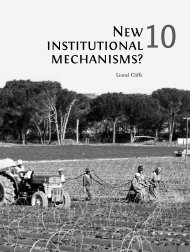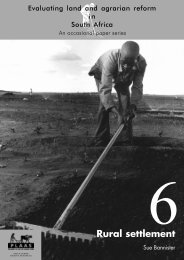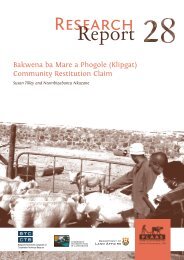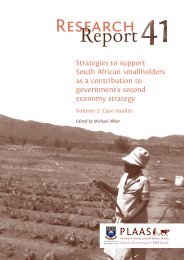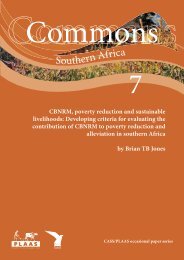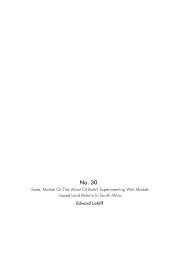You also want an ePaper? Increase the reach of your titles
YUMPU automatically turns print PDFs into web optimized ePapers that Google loves.
<strong>PLAAS</strong> has establishedthe first post-graduateprogramme in Land andAgrarian Studies in thecountry and in the regionTEACHING ANDSUPERVISION<strong>PLAAS</strong> has established the first post-graduate programme in Land and Agrarian Studies in the country andin the region. Teaching and supervision is currently undertaken for Post-Graduate Diploma, MPhil and PhDstudents. The programme aims to meet an identified demand in the land and agrarian reform sector in theSouthern African region for post-graduate training in policy analysis skills, and to service a range of careeroptions within these sectors (e.g. planners, policy makers, fieldworkers and researchers). Most students arein full-time employment, and teaching takes place in three intensive ‘block-release’ periods during the year.The specific objective of the programme is to develop appropriate knowledge and skills that will enable policymakers, planners, managers, researchers and field workers in the sector to:• conceptualise key policy issues of land and agrarian reform• analyse problems of policy formulation and programme design• plan effective programmes and projects• undertake research on important questions of policy and practice.Most MPhil students write mini-theses. The MPhil by full thesis and PhD degrees are generally pursued bythose students who intend to work as researchers or academics.The first <strong>PLAAS</strong> PhD student was registered in 1997. The Post-Graduate Diploma and MPhil coursecommenced in 2001 and numbers have risen steadily over the past four years, attracting students fromNamibia, Mozambique, Zimbabwe, Lesotho and Tanzania as well as South Africa. At present 85 students areregistered, including seven PhD students, 31 MPhil and 47 Diploma students. Graduates to date number 22.Throughput of students is slower than anticipated, mainly due to the demanding nature of part-time study forthose in full-time employment.In 2003, <strong>PLAAS</strong> won the Group Award from UWC’s Division for Lifelong Learning for its innovative approachto recognition of prior learning for entrants to the post-graduate programme.In addition to undertaking teaching and supervision on Land and Agrarian Studies, <strong>PLAAS</strong> staff also teachon the Rural Development and Natural Resource Management modules offered by the School of Governmentand on the Development Studies programme at the Norwegian University of Life Sciences. They giveoccasional lectures in the Rural Development module offered by the Institute of Social Development at UWC,and in different departments at the Universities of Cape Town and Stellenbosch.<strong>PLAAS</strong> has been animportant provider ofshort course and inservicetraining to theland and agrarian reformsectorSHORT COURSE TRAINING<strong>PLAAS</strong> has been an important provider of short course and in-service training to the land and agrarianreform sector. Since 1996, <strong>PLAAS</strong> researchers, often in collaboration with Rick de Satgé of DevelopmentalServices, have been commissioned to design and develop a range of short courses customised to meet theneeds of different government departments (notably the Department of Land Affairs) and NGOs (amongstothers the National Land Committee and its affiliates, and the Women on Farms Project). Some courses havebeen regional in scope, and have drawn participants from across southern Africa and have been offered incollaboration with the Land Tenure Center of the University of Wisconsin-Madison, and the Centre for AppliedLegal Studies (CALS) at Wits, and others with the Centre for Applied Social Sciences at the University ofZimbabwe.Courses have included the following: Land Tenure and Policy in South Africa; Tenure Basics; Land RestitutionPolicy and Procedures; Land Use and Livelihoods; The Integration of Environmental Planning into LandReform; Governance in Community-Based Natural Resource Management; Social Science Perspectives onNatural Resource Management.A total of over 500 participants have attended these courses, and their evaluations of the training they havereceived have been overwhelmingly positive.6




